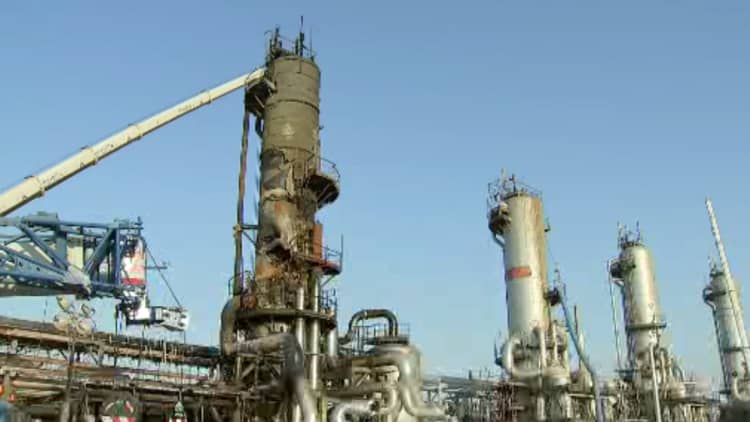Saudi Arabia, Russia and their oil-producing allies are considering a range of options to maintain stability in the oil market just weeks ahead of a critical December meeting.
The so-called OPEC+ group struck another deal late last year to cut oil output by 1.2 million barrels per day (bpd) to support prices. The agreement runs until March 2020, and the producers are due to meet in Vienna to review the terms of the policy on December 5-6.
"The house view is that the meeting is likely to reaffirm the group's commitments to the cut that is already in place," Peter Lee, senior oil and gas analyst at Fitch Solutions, told CNBC's "Capital Connection" Thursday.
"The current deal will remain in place until the end of Q1 (the first quarter) next year, and we see scope for the deal to be extended until the end of next year," Lee added.
Saudi Arabia to pressure laggards?
Analysts believe that OPEC kingpin Saudi Arabia is likely pressuring laggard members, such as Iraq and Nigeria, to improve their own compliance in order to bolster crude prices ahead of the long-awaited Saudi Aramco initial public offering (IPO).
"According to delegates across the group, they will be pushing for better adherence to the current production cut agreement," analysts at ANZ Bank said in a research note on Thursday.
But the need for deeper production cuts remains uncertain, given the slew of major events leading up to the December 5-6 Vienna meetings that could complicate the decision-making process.
On December 3-4, President Donald Trump and Chinese President Xi Jinping may come face-to-face at the NATO Heads of State and Government meeting in London. While the meeting and the location are not yet confirmed, a resolution to the trade war may prove to be a catalyst for oil prices and likely reduce the need for OPEC+ to act.

Aramco IPO in December
Meanwhile, Aramco is reportedly planning to release its IPO pricing on December 4 — just one day ahead of the Vienna meetings. Clarity on the pricing could also influence the producer group's decisions.
"It makes sense for people to argue that because of the IPO and other reasons, they will push for deeper cuts. I'm not buying into that straight away," Vandana Hari, founder of Vanda Insights, told CNBC's "Squawk Box Asia."
"Russia has become far more dovish, and we've seen that clearly since the end of last year. If prices remain supported around current levels and there is no danger of them continuing to tumble below, I think overall especially with regards to Russia, the argument will be far more difficult for the Saudis to make for deeper cuts," she added.
Others analysts disagree.
"There appears (to be) an increasing likelihood that Saudi Arabia, along with other core OPEC+ members, the UAE, Kuwait and Iraq, might need to contemplate deepening the magnitude of cuts in the upcoming OPEC+ meeting in Vienna between 5-6 December, even if Russia refrains from cooperating," said Ehsan Khoman, head of MENA research and strategy at MUFG.
Saudi Arabia, a major producer and de facto leader of OPEC, has considerable influence within the producer group. It may also consider shouldering more of the production cuts alone, analysts believe.
"Saudi certainly has the will and capability within its scope to lower production if need be," Lee said.
"It remains to be seen how far Saudi Arabia is willing to go in terms of supporting the market, but as things stand right now, we are not factoring in a deeper OPEC cut that will be coming into play next year," Lee said.
Despite the success of the multi-country agreement, sentiment in the oil market has remained weak. Brent crude on Thursday was trading around the $62 a barrel, down from a 2019 high near $75 in April.



